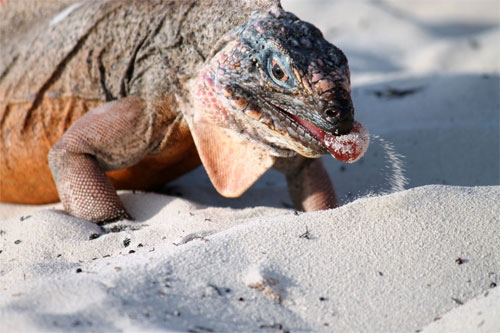|

|
 |
|
Last Updated: Feb 6, 2017 - 2:32:04 PM |

(Photo: Kate Hardy)
|
Nassau, Bahamas - Feeding wildlife is an increasingly common tourist activity here in our islands, especially the Family Islands. But a new study published online by the journal Conservation Physiology by Dr. Charles Knapp, PhD, of the John G. Shedd Aquarium in Chicago, and a team of researchers shows that endangered iguanas are suffering further physiological problems as a result of being fed by tourists and locals.
The two year study compared rock iguanas living on tourist-visited islands and those living on non-tourist-visited islands and the physiological differences and infection rates. Blood and fecal samples were collected from both male and female iguanas during two research trips in 2010 and 2012.
“Scientific studies such as the one conducted by Dr. Knapp and his colleagues, provide useful information to us, helping us understand how these endangered iguanas are impacted by humans,” commented Vanessa Haley-Benjamin, BNT Director of Science and Policy. “If we are to protect the biodiversity of our islands and the endangered species found here, we must first seek to understand the threats and then work to minimize them. Studies like this one allow us to make informed decisions regarding the conservation of the species.”
The Bahamian rock iguana is among the world’s most endangered lizards due to habitat loss, introduced mammals, illegal hunting, threats related to increased tourism, and smuggling for the illicit pet trade. As a result, the Bahamian rock iguana is listed on the IUCN Red List of Threatened Species.
BNT past President and foremost Bahamian iguana specialist Sandra Buckner was a member of the research team, . The other members of the team included Kirsten Hines, Trevor Zachariah, Caro Perez-Heydrich, John Iverson, Sandra Buckner, Shelley Halach, Christine Lattin, L. Michael Romero and headed by Dr. Charles Knapp.
The researchers also discovered that there were dietary differences in the iguanas and that iguanas on tourist-visited islands had a 100% infection rate. Dr. Knapp noted, “The biological effects of altered biochemical concentrations may not be manifested over a short time period, but could have deleterious effects on long-term fitness and population stability.”
Aware that it is very difficult to completely restrict feeding the iguanas, the research suggests that tour operators and guests use pellets to feed the iguanas rather than giving them human foods. “It is important to help protect and sustain the Bahamian rock iguanas,” noted Haley –Benjamin. “And we all understand the normal desire to feed and help them, but if we can play a better part in their lives by feeding them foods that are nutritional for them rather than the foods we eat.”
To learn more about the research visit http://www.sciencedaily.com/releases/2013/12/131205220120.htm or contact the Haley-Benjamin at vhaley-benjamin@bnt.bs or 242-396-0166. “These iguanas also help us in our tourism diversity, it’s good to know that by feeding them correctly we will help them survive longer and we hope thrive.”

© Copyright 2014 by thebahamasweekly.com
Top of Page
|
|
 |

|
